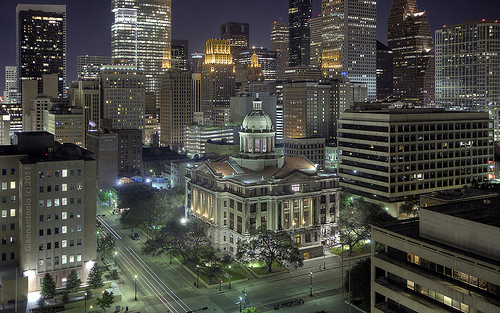I’m not sure why there hasn’t been more of a push to deal with this.
As Harris County’s population continues to swell, more people means more crimes. And that results in more work for the county’s 22 felony courts.
But no court is busier right now than the 209th, which is overseen by Michael McSpadden, Harris County’s most senior felony court judge. He has a docket of pending cases that eclipses all other felony courts locally.
With a caseload of 1,159, McSpadden has 440 more pending cases than his colleagues’ average of 718, according to a report this month by the Harris County Criminal Justice Coordinating Council.
Judges and others say the larger the docket, the more every case is slowed down. That means suspects who are lingering in jail and the victims in those cases may wait years for the case to go to trial, plead out or get dismissed.
The correlation between the size of the docket and the quality of justice, however, is a hotly debated question.
[…]
The more than 1,100 cases in his court is a surprising number that even McSpadden says needs to come down.
“This is my 31st year on the bench and when I had one of the better dockets, I was criticized that I might be rushing cases through – putting too much pressure on attorneys to plead cases, which was certainly not true,” McSpadden said last week. “In the past three years, it has built up, and I have no idea why. I don’t think my attorneys are handling cases differently.”
[…]
“The best judge in the criminal courthouse has the highest docket,” said Todd Dupont, president of Houston’s criminal defense lawyer organization. “(McSpadden) doesn’t let fear of the size of his docket dictate the quality of the proceedings, which is where a lot of judges fall short in Harris County.”
Dupont, who practices in front of McSpadden, said the problem in Harris County is that other judges worry too much about docket sizes.
“Historically we have seen judges use that reasoning to encourage people to plead guilty,” Dupont said. “Who cares about the size of the docket? Conversations about dockets are meaningless unless you use it as a tool of oppression, and that’s just mean, and probably illegal.”
[…]
“The bottom line is we haven’t had a new court since 1985, and the filings haven’t slowed down and aren’t going to slow down,” [Presiding Judge Susan] Brown said. She said there is little hope of getting more judges, more courts or more money. “We’re trying to find creative ways to resolve these issues because we’re not going to get any help.”
Although the crime rate has fallen in recent years, the county’s population continues to grow, creating a net increase in criminal cases going through the system.
Since 1985, when Houston’s last criminal district court was created by the Legislature, the number of felony filings has doubled from 22,000 a year to 44,000. Courts that used to see 1,000 cases a year are now scrambling to deal with twice that many.
Well okay then. Maybe there isn’t much hope for getting more judges, but has anyone asked? If the number of felony filings has doubled since the last time there was a new criminal court added, then isn’t that some pretty strong evidence that there’s a need? I recognize that Harris County may not want to have to pay for more judges, but if everyone is so concerned about the quality of justice being dispensed in courtrooms with such overflowing dockets, isn’t it irresponsible not to ask for more judges? Complaining about it isn’t going to change anything. There’s a fundamental disconnect here.
I should note that there is another way to deal with this, one that doesn’t involve a legislative or financial solution, and that’s to file fewer felony cases. Though there was no breakdown of that “22,000 felony filings” number, I’ll bet that a significant fraction of them are drug cases, and that a significant fraction of those are non-violent possession cases, including the infamous “trace cases” that are now being filed as felonies again. As of a few months ago at least, that had not caused an increase in the county jail population, but that doesn’t mean there isn’t an effect. We could file fewer such cases as felonies, and we could push the Legislature to reform the laws that make drug possession and other non-violent crimes felonies. Again, though, complaining is not likely to bring about any changes.


Harris County does not need more judges and courtrooms, rather Harris County needs to lead the charge to have certain crimes reclassified as proposed by Judge McSpadden. Also and perhaps the simplest solution is to utilize courtrooms the entire workday. Seldom are courts in session in the afternoon. All courts have docket call at 830 am or 9 am and then little happens after the lunch hour in most courtrooms in Harris County.
Wonder why courts don’t degregate their dockets and have a 9 am docket call and a 1 pm docket call. Certain cases could be heard at the afternoon docket call thereby maximizing use of court resources, reducing the enormous traffic jam of people that arrives prior to 830 am each day, and allow for time to review cases and make informed decisions about victim and defendant rights.
Having judges work a full day for the salary they receive would be a great first step to moving cases and dealing with the current workload. Judges and their staffs do very little after the lunch hour….just make a random tour of the courthouse any weekday to confirm this fact.